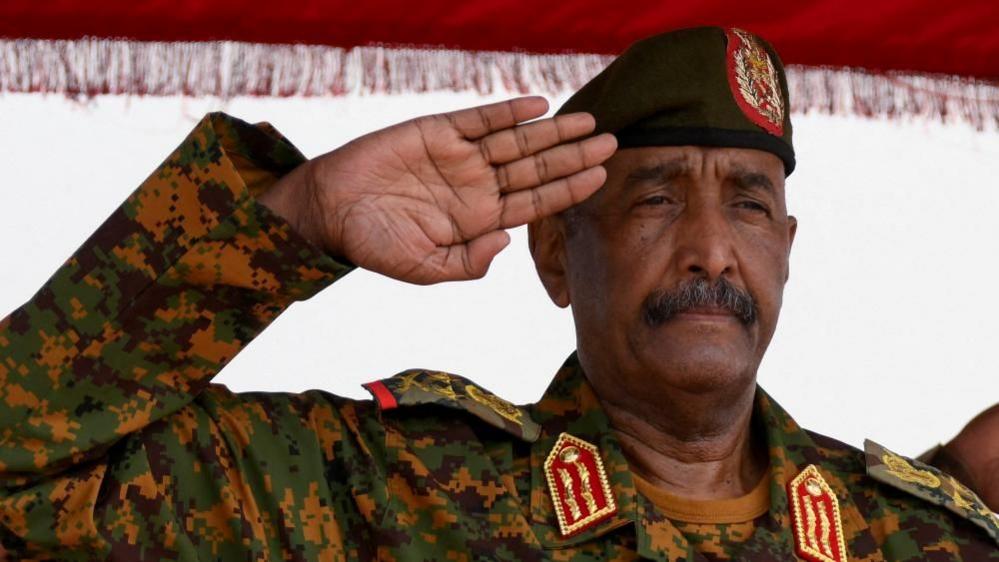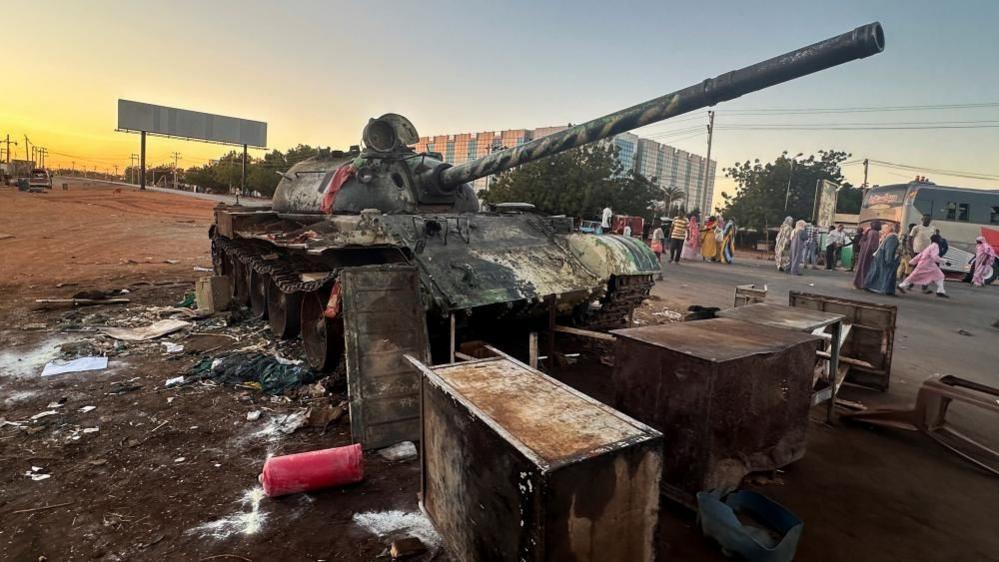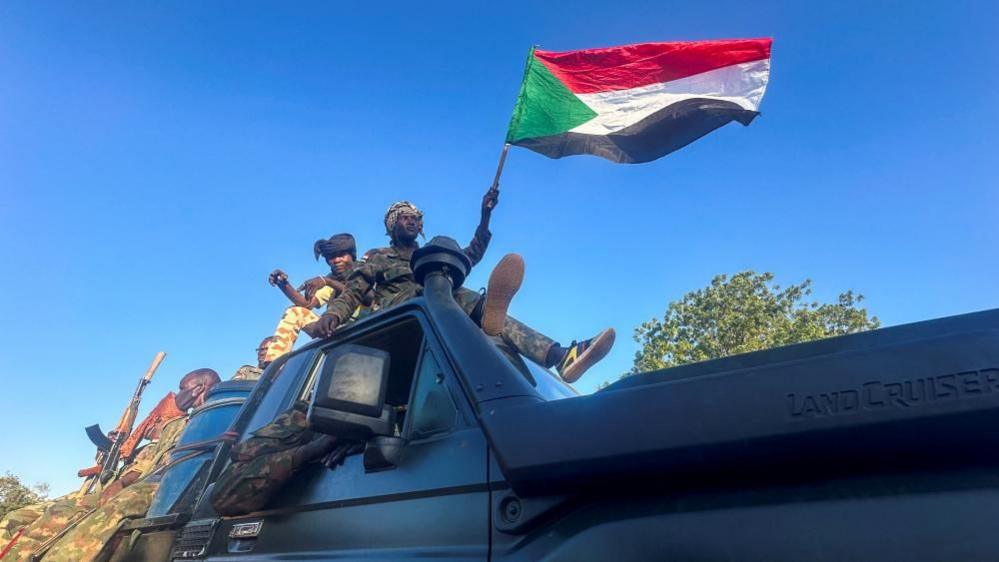US sanctions Sudan army chief Burhan over civilian deaths

Gen Abdel Fattah al-Burhan has been leading the army during Sudan's 21-month civil war
- Published
The US government has imposed sanctions on the head of Sudan's army and de facto president, Gen Abdel Fattah al-Burhan.
He has been leading one of the two sides in the 21-month civil war that has killed tens of thousands, uprooted over 12 million and pushed the country to the brink of famine.
In a brief statement, the US treasury department accused Gen Burhan of "destabilizing Sudan and undermining the goal of a democratic transition".
The announcement follows reports of the killing of civilians in the central city of Wad Madani in recent days, however this was not mentioned in the statement.
Sudan's foreign ministry has condemned the sanctions as "strange and troubling".
Last week, Mohamed Hamdan Dagalo, the head of the paramilitary group fighting the army, was also sanctioned by the US.
The US accused Dagalo's Rapid Support Forces (RSF) of committing genocide during the conflict.
In announcing the sanctions on Burhan on Thursday, Washington said that the army under his command "has committed lethal attacks on civilians" including targeting "schools, markets and hospitals".
The US also alleges that the army is "responsible for the routine and intentional denial of humanitarian access, using food deprivation as a war tactic".
The sanctions freeze any assets the Sudanese leader has in the US and also block US transactions with him.
The Treasury Department issued exemptions for humanitarian goods, but aid groups fear the army could retaliate by further blocking assistance.
During the first year of the conflict, Secretary of State Antony Blinken said the army had committed war crimes.

The Sudanese military has achieved a major victory by recapturing Wad Madani
Earlier, Gen Burhan ordered an investigation into allegations that his troops carried out widespread atrocities after recapturing the capital of Gezira state from their paramilitary rivals.
His move came after widespread concern that civilians - including foreign nationals - were killed after the seizure of Wad Madani.
Neighbouring South Sudan said on Wednesday that it had summoned Sudan's ambassador to protest against "the loss of lives among our innocent citizens".
Wad Madani, which is 87 miles (140km) south of the capital, Khartoum, fell to the RSF about a year ago. The military regained control of it on Saturday.
The city serves as a strategic crossroads, connecting several states through key supply highways. It is also the closest major town to Khartoum.
A Sudanese rights group accused the military of going on a rampage, killing at least 13 people in Camp Taiba, a village about 20km away.
The UN's humanitarian chief in Sudan, Clementine Nkweta-Salami, said she was deeply concerned about reports of retaliatory attacks against civilians in Gezira "based on alleged affiliation or ethnicity".
The US special envoy for Sudan Tom Perriello called the reports "appalling" and urged the army and allied groups to investigate and hold those responsible accountable.
Gen Burhan said he had set up a committee to investigate the alleged killings in Camp Taiba, and has asked it to report back within a week.
He did not comment about the concerns raised by South Sudan, and whether the investigation would focus on alleged atrocities elsewhere in Gezira.
South Sudan's foreign ministry said that it had received a "comprehensive report" from its embassy in Sudan "detailing the unfortunate events that have resulted in the loss of lives among our innocent citizens, who maintain a non-combatant status".
The military has previously accused the RSF of hiring South Sudanese as "mercenaries" to fight on its side.

Both sides have been accused of atrocities in the conflict
Social media videos of various incidents, including one showing a man in civilian clothing being thrown over a bridge and then shot at by a group of men, have been widely shared online.
BBC Verify has confirmed the video was filmed along the Hantoub bridge over the Blue Nile river.
We have matched key elements in the video including the railings and the painting on the railings as seen in the video to earlier videos filmed at the bridge.
One of the men involved in the incident, and who is carrying a Sudanese flag, is wearing clothing with a logo used by the al-Bara'a bin Malik Brigade which has been fighting alongside the Sudanese army in Khartoum and neighbouring states.
Two other videos filmed elsewhere show at least 30 bodies of men in civilian clothing laid out on a ground next to a wall.
BBC Verify has established, through matching objects seen in the video with satellite imagery, that the videos were filmed at a location north-west of Wad Madani just a few metres from where the army appears to have ambushed RSF fighters.
It is not clear how the men died and whether they were killed before the bodies were gathered there.
It is also not possible to identify them nor whether they were affiliated to any of the fighting parties, as it is common for armed fighters not to wear uniforms.
Videos of the ambush, heavy exchange of fire, and the aftermath are also circulating.
The Sudanese armed forces on Tuesday condemned what it called "individual violations" in some parts of Gezira state, and promised that those responsible would be held accountable.
The RSF was itself accused of carrying out retaliatory attacks in Gezira following the defection of their commander Abu Aqla Kaikal in October last year.
Kaikal was heavily involved in the operation that led to the army wrestling back control of Wad Madani.
Additional reporting by Yussuf Abdullahi and Barbara Plett Usher
More BBC stories on Sudan conflict:

Go to BBCAfrica.com, external for more news from the African continent.
Follow us on Twitter @BBCAfrica, external, on Facebook at BBC Africa, external or on Instagram at bbcafrica, external